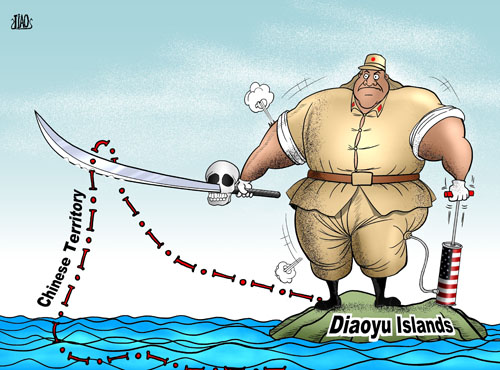Dear Japan: Choose your actions wisely
The capture of a Chinese captain by Japanese authorities in Diaoyu waters earlier this month has presented Japan with some thorny options. Releasing him before prosecuting him will humiliate a fragile Japanese government, while releasing him immediately after prosecuting him will not deter future Chinese vessels from entering and fishing in Diaoyu waters. Having the captain serve a prison sentence would be even worse for Sino-Japanese relations, straining them in the long term and affecting the countries' relationships in other areas. Thus, it makes most sense for Japan to choose the first option: resolve the issue at once before relations between Japan and China deteriorate.
|
|
|
Provocation??????????? [By Jiao Haiyang/China.org.cn] |
Diaoyu Islands is a classic example of territorial disputes between two countries. Territorial disputes are often caused by historical, legal and population identity factors, so the different sides can hardly claim ownership of the territory and control it uncontested. Therefore, the two sides should take rational measures to diffuse tensions and avoid arousing anger and hatred toward each other.
China has so far done little in response in an attempt to not make the situation worse. It has suspended visits of high-ranking officials to Japan while waiting for Japan to make the choice it wants Japan to make. And Jiang Yu, a spokesperson for the government, has urged Japan to stop enforcing its laws in Diaoyu waters and to refrain from taking any action that would threaten the security of Chinese fishing boats and their crew.
It is rather hostile of Japan to intercept and inspect a Chinese fishing trawler and arrest and charge the Chinese captain according to Japanese laws. If Japan does not stop this behavior, China may take countermeasures, such as intensifying its patrol around the Diaoyu Islands to protect Chinese fishermen, resulting in an unhealthy escalation of disputes regarding the territory.
China and Japan has made much progress in developing good relations in recent years. It is not beneficial for any countries in East Asia to see an escalation of tension between China and Japan. Japan should bear responsibility for starting this mess and take conciliatory measures and actions first. Only then might China discuss the issue of Diaoyu Island with Japan at some point in the future.
It will be rational for China and Japan to take realistic and pragmatic measures to disengage executive powers around the Diaoyu Islands and make the seas and the Diaoyu Islands a region of peace. Then, the two sides can discuss the ownership of the Diaoyu Islands in a strategic and peaceful way, based on a long-term perspective of stability and development of the two countries and regional integration and prosperity.
 0
0 







